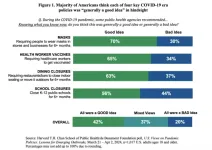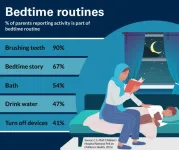Embargoed for release: Monday, June 17, 6:00 AM ET
Boston, MA—A majority of Americans say that several key policies to stop the spread of COVID-19 were generally a good idea in hindsight, according to a new national poll by Harvard T.H. Chan School of Public Health and the de Beaumont Foundation. The poll also found, however, that views varied across policies, and many say the policies had negative impacts.
The poll, U.S. Views on Pandemic Policies: Lessons for Emerging Outbreaks, was conducted March 21 to April 2, 2024, among a nationally representative, probability-based sample of 1,017 adults ages 18 or older.
A majority of Americans say four key pandemic policies were “generally a good idea” in retrospect, including those related to:
• Mask requirements in stores and businesses – 70%
• Healthcare worker vaccination requirements – 65%
• Indoor dining closures – 63%
• K-12 public school closures – 56%
Forty-two percent of Americans say all four policies were a good idea and another third (37%) say only some were a good idea. Only 20% say all were “generally a bad idea.”
Views on these pandemic policies vary by subgroup characteristics, including political party affiliation, race, ethnicity, and metropolitan status. The percentage who say all four policies were generally a good idea:
• Democrats (71%); Independents (44%); Republicans (18%)
• Black adults (62%); Hispanic/Latino adults (55%); white adults (32%)
• People living in urban areas (55%); suburban areas (39%); rural areas (29%)
Notably, there is some policy receptivity among all subgroups, with majorities of each subgroup saying at least one of the four policies was generally a good idea. For example, 62% of Republicans say at least one was generally a good idea, as do 70% of people living in rural areas.
Reasons given for disliking pandemic policies are both practical and principled. Among those who say key policies were generally a bad idea, top reasons include beliefs that policies went on too long (84–87% across policies), concerns about political motivations behind policy decisions (60–81%), concerns about effects on the economy (68–91%), and perceived lack of personal choice for the people involved (75–94%). Among those who say school closures were generally a bad idea, nearly all say major reasons include their perceptions that policies had negative effects on children’s learning (97%) and mental health (91%).
“In order for all Americans to benefit from public health protections during outbreaks, leaders need to see there are opportunities to build on public receptivity, even where it is limited, and understand where people’s concerns come from,” said survey director Gillian SteelFisher, director of global polling in the Harvard Opinion Research Program and principal research scientist at Harvard Chan School. “These data suggest that keeping outbreak response policies focused on the most at-risk populations, communicating clear, limited time frames, and considering the broader economic and societal impacts of policies could go a long way to maintaining public support in the next outbreak and beyond.”
“Public health professionals need to know that these vital protections are still available in their toolboxes,” added Brian Castrucci, president and CEO of the de Beaumont Foundation “Understanding what drives resistance for some people can help inform the best ways to use and communicate about these policies should we need to call on them in the future.”
Additional findings from the poll show that Americans have differing beliefs about how severe the threat of COVID-19 was early on in the pandemic. There are very few total COVID-deniers, with only 3% saying COVID-19 was not a health threat to anyone early in the pandemic. But many say COVID-19 was not a serious health threat to everyone early on. This includes 14% who say it was a serious health threat only to people who are very old or frail and 45% who say COVID-19 was a serious health threat to more people, including people who are very old or frail as well as those with underlying medical conditions. About one third (37%) say it was a serious health threat to everyone early on. Americans who say the threat was more widespread early on are more likely to say key pandemic policies were generally a good idea.
Methodology
Results are based on survey research conducted by Harvard T.H. Chan School of Public Health, in partnership with the de Beaumont Foundation. Representatives from each organization worked closely to develop the survey questionnaire, while analyses were conducted by researchers from Harvard and the fielding team at SSRS of Glen Mills, Pennsylvania.
The project team at Harvard was led by Gillian SteelFisher, principal research scientist and global polling director of the Harvard Opinion Research Program, and included Hannah Caporello, senior research projects manager, and Mary Findling, assistant director.
The project team at the de Beaumont Foundation was led by Brian Castrucci, president and CEO of the de Beaumont Foundation, and included Katy Evans, senior program officer, Emma Dewhurst, program and research associate, Mark Miller, vice president of communications, and Nalini Padmanabhan, communications director.
Interviews were conducted with a representative sample of 1,017 adults, age 18 and older, in English and Spanish online and by telephone. Respondents were reached online and by phone through the SSRS Opinion Panel, a nationally representative, probability-based panel. Panelists were randomly recruited via an Address Based Sampling (ABS) frame and from random-digit dial (RDD) samples on SSRS surveys. Most panelists completed the survey online with a small subset who do not access the internet completing by phone. The interview period was March 21 to April 2, 2024.
When interpreting findings, one should recognize that all surveys are subject to sampling error. Results may differ from what would be obtained if the whole U.S. adult population had been interviewed. The margin of error for the full sample is ±4.1 percentage points. Subgroup differences were emphasized only if they differed by at least 10 percentage points, for statistical significance and practical implications. Race/ethnicity was categorized as non-Hispanic white, non-Hispanic Black/African American, and Hispanic/Latino. For political party affiliation, Democrat/Republican include those who lean toward either party, and Independent includes unaffiliated adults who do not lean toward either party.
Possible sources of non-sampling error include non-response bias, as well as question wording and ordering effects. Non-response in web and telephone surveys produces some known biases in survey-derived estimates because participation tends to vary for different subgroups of the population. To compensate for these known biases and for variations in the probability of selection within and across households, sample data are weighted in a multi-step process by probability of selection and recruitment, response rates by survey type, and demographic variables (race/ethnicity, gender, age, education, region, the frequency of internet use, civic engagement, and population density) to reflect the true U.S. population. Other techniques, including random sampling, multiple contact attempts, replicate subsamples, and systematic respondent selection within households, are used to ensure that the sample is representative.
###
Harvard T.H. Chan School of Public Health brings together dedicated experts from many disciplines to educate new generations of global health leaders and produce powerful ideas that improve the lives and health of people everywhere. As a community of leading scientists, educators, and students, we work together to take innovative ideas from the laboratory to people’s lives—not only making scientific breakthroughs, but also working to change individual behaviors, public policies, and health care practices. Each year, more than 400 faculty members at Harvard Chan teach 1,000-plus full-time students from around the world and train thousands more through online and executive education courses. Founded in 1913 as the Harvard-MIT School of Health Officers, the School is recognized as America’s oldest professional training program in public health.
Founded in 1998, the de Beaumont Foundation creates and invests in bold solutions to create communities where everyone can achieve their best possible health. Its focus is advancing policy, building partnerships, strengthening the public health system, and improving health communication. Recognizing that health is the foundation for a strong nation, de Beaumont incites action and drives change to create thriving communities and improve lives.
END








